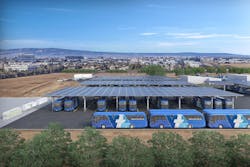Scale Microgrid, Proterra building Solar-Storage, EV Charging for Santa Clara mass transit
The Santa Clara Valley Transportation Authority (VTA) is contracting partners to develop and deploy a solar and storage microgrid and electric vehicle charging system which can both reduce the system’s emissions and provide emergency backup power in the event of a blackout.
VTA will bring in EV-infrastructure firm Proterra and Scale Microgrid Solutions to install the hybrid backup power and fleet electrification tools needed. The project was made possible with a grant from the California Energy Commission.
The microgrid installed by Scale will allow VTA to operate its electric buses and the Cerone Bus Yard in the event of grid outages in the region. The solar PV and battery energy storage system will give VTA operational flexibility on when to purchase the utility power needed to charge its vehicle fleet, saving the agency on its electricity costs and further reducing its total operating costs compared to continued diesel bus operations, the companies said.
The microgrid will include 1.5 MW of solar power installed on available rooftop space and an overhead carport canopy at the Cerone Bus Yard. The solar will be paired with a 1-MW/4MWh battery storage system to provide back-up electricity for up to 20 hours.
“California’s electric grid needs distributed energy resources in order to support fully electrifying its transportation sector,” says Tim Victor of Scale Microgrid Solutions. “The system we are deploying for VTA will set the example of how distributed energy will alleviate many of the risks associated with the energy transition and provide cleaner, cheaper and more reliable charging power.” The transit agency will deploy two Proterra fleet chargers to power 34 electric transit buses.
Work begins later this year and the project is expected to be completed in the third quarter of 2023. The VTA serves thousands of riders per day, according to reports.
“This project combines several VTA goals. It shifts us toward greener sources of energy, saves VTA money that can be reallocated to other operating needs and provides the infrastructure to charge our next batch of zero-emission buses,” said Adam Burger, Senior Transportation Planner with VTA. “Our riders will benefit from a newer, quieter fleet and we will decrease our contribution toward climate change and poor air quality.”
The microgrid and charging infrastructure will be linked together by switchgear and controls designed by Schneider Electric.
For extended outages, VTA said it can bring on a temporary generator to sustain fleet operations.
-- -- --
(Rod Walton, senior editor for EnergyTech, is a 14-year veteran of covering the energy industry both as a newspaper and trade journalist. He can reached at [email protected]).





